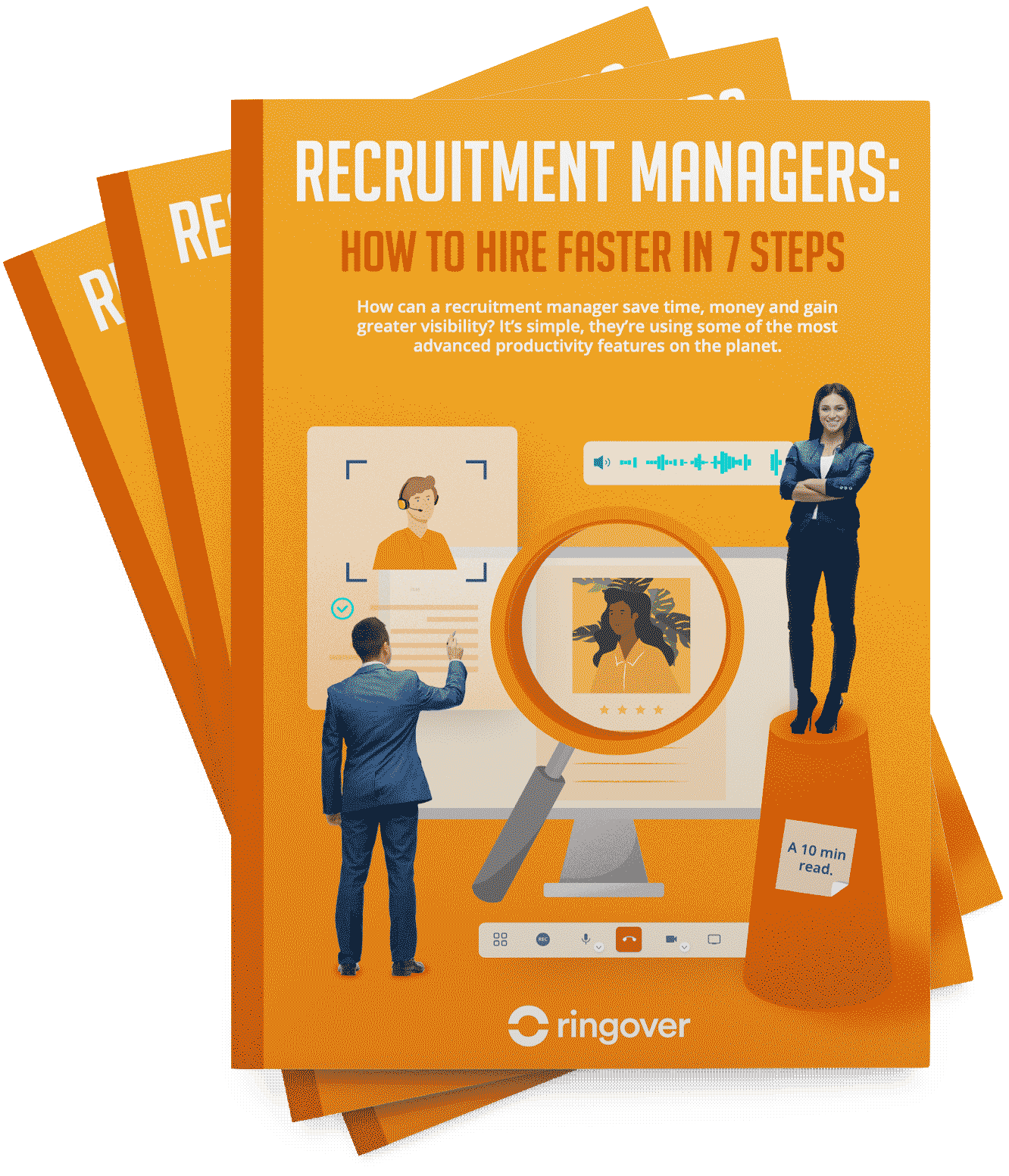Summary
Your company is experiencing growth, and you need reinforcements to stay on course with the goals you've set? This means you'll need to implement a solid recruitment strategy. But how can you achieve effective staffing? What tools should you adopt to align your recruitment process with the company's objectives?
Ringover for Recruitment5 Tips for Effective Staffing
| Tips | How to Execute the Tip |
|---|---|
| Identify company's needs | Clearly define the job requirements and consult stakeholders when drafting the job description |
| Use tools and recruitment channels | Choose your recruitment channels based on data regarding where the desired candidates seek jobs |
| Choose the ideal candidate | Remain objective and bring a human touch via open communication |
| Finalize the hiring process | Wrap up administrative processes and provide the candidate with clear instructions |
| Onboard and train the new candidate | Create a comprehensive and engaging onboard process |
1. Clearly Identify the Company's Needs
It's essential to start by meticulously defining your needs: what are the requirements for the positions to be filled, what candidate profiles are you looking for, what qualifications and skills are necessary?
These elements will help you in drafting a detailed job description including key elements such as tasks and missions, qualifications, experience, etc.
Involve the various collaborators responsible for recruitment from the outset to align everyone and have a precise definition of the profile sought.
These individuals can also guide you in drafting a description that aligns with the company's strategic objectives.
2. Use Appropriate Recruitment Tools and Channels
The deployment of your recruitment strategy relies on the coordination of your various recruitment channels.
You can enlist the help of recruitment agencies, advertise on social media, use job boards, or your careers website.
However, it's not about posting ads everywhere. Even if your intuition may be good, it's important to leave as little as possible to chance.
Therefore, it's necessary to structure the dissemination of your ads and choose your channels based on the profiles you are seeking to avoid potential biases. Structuring the dissemination also helps to replenish your pool of candidates with qualified profiles. Thus, you maximize your chances of conducting successful interviews.
3. Choose the Ideal Candidate
A single interview of a few minutes is not always sufficient to uncover all the potential of a candidate. Moreover, biases can occur here as well. This is where selection tests come into play.
Indeed, you can use psychometric tests, personality tests, and aptitude tests to assess the technical skills of talents and add an additional layer of objectivity to your process.
However, it's important to ensure that this process remains sufficiently human by establishing a relationship of trust with the candidates. This can be manifested through transparent and benevolent communication at all stages of recruitment.
4. Finalize the Hiring Process
Once all pre-employment tests and interviews have been conducted, it will be time to make the final decision.
Administrative formalities can be tricky for both you and the talents. Provide them with all necessary documentation. Be comprehensive and clear about the justifications to provide and the communication channels to use.
5. Properly Integrate and Train the New Employee
The recruitment process does not end with hiring. The integration stage, also called "onboarding," is essential to ensure a successful and sustainable start. It contributes to motivating and also retaining the talents joining your organization.
What solutions for effective recruitment?
To attract and retain the best talents, you will need sufficiently efficient and reliable tools. Here are some examples:
| Recruitment Solution | Main Purpose | Advantages |
|---|---|---|
| Ringover | Manage communications | Easily integrates with recruitment tools |
| Empower | AI solution to analyze interactions with candidates | Quickly and precisely analyze interactions |
| Cadence | Structure the recruitment process | Define specific objectives for each recruit and create necessary workflows |
| PeopleGPT | Find ideal profiles | Rapid complete tasks |
| LinkedIn Talent Solutions | Identify profiles for the open posts | Find ideal candidates for your needs |
| Zoho Recruit | Engage candidates and manage the recruitment process | Automate simple tasks |
| Bullhorn | Optimize the interview process | Automate tasks and centralize information with integrations |
| Beetween | Manage applications | Multifunctional tool |
| Taleez | Candidate management | Easily track candidate pipeline |
| Factorial | End-to-end HR platform | Triage resumes easily |
| Docusign | Remotely sign contracts | Simplify and automate contract signatures |
| ChatGPT | Create recruitment-related content | Improve and simplify content creation |
Further recommendations for effective recruitment
In addition to the previous advice and the aforementioned tools, we recommend adopting and maintaining a flexible approach throughout your recruitment process. Here are some additional recommendations to ensure effective recruitment:
- Building a strong and attractive employer brand: Investing in the development of your employer brand can help you attract quality candidates. Highlight the company culture, benefits offered, and professional development opportunities.
- Adapting to new technologies: Technological advancements can revolutionize your recruitment process. Stay abreast of new technologies and emerging recruitment trends, such as AI in recruitment and automation, to optimize your recruitment process.
- Seeking feedback: In a continuous improvement approach, after each recruitment process, it can be valuable to obtain feedback from candidates, including those you did not select, as well as from involved collaborators. This will allow you to identify areas for improvement to optimize your future recruitments.
By implementing these recommendations and remaining attentive to the sometimes-changing needs of your company and the labor market, you will be on the right track.
Ringover can support you in this process by providing communication and conversational analysis tools to build authentic relationships with your candidates and recruit faster.
To learn more about how to deploy Ringover products within your HR department or throughout your entire company, start your free trial today!
Effective Recruitment FAQ
What is the most effective method of recruitment?
The most effective method of recruitment varies depending on the specific needs of the organization and the nature of the job role. Commonly used recruitment methods include:
- Job postings on industry-specific platforms
- Employee referrals
- Recruitment agencies
- Social media advertising
However, the effectiveness of each method should be assessed based on factors such as the target talent pool, job requirements, and the organization's overall recruitment strategy.
How to make recruiting more effective?
Making recruiting more effective involves several key steps, including:
- Defining clear job roles and requirements: A clear and detailed job description helps to attract candidates who closely match the position's needs.
- Utilizing targeted sourcing channels: Identifying and utilizing the most relevant channels to reach potential candidates, such as industry-specific job boards, professional networking sites, and recruitment events.
- Streamlining the application and selection process: Simplifying the application process and utilizing technology to streamline candidate evaluation can improve efficiency and candidate experience.
- Building a strong employer brand: Cultivating a positive employer brand through transparent communication, showcasing company culture, and highlighting employee testimonials can attract top talent.
What is an effective staffing approach?
An effective staffing approach involves aligning the organization's workforce needs with its strategic objectives. This includes:
- Forecasting staffing requirements
- Talent acquisition
- Onboarding
- Ongoing talent management
The approach should focus on identifying and acquiring the right talent, ensuring that they are placed in roles that maximize their skills and potential, and continuously developing and retaining top performers.
What is a recruiting strategy?
A recruiting strategy outlines the approach and tactics that an organization uses to identify, attract, and hire qualified candidates. It encompasses the entire recruitment process, from initial talent sourcing to onboarding. A well-defined recruiting strategy includes elements such as candidate sourcing methods, employer branding initiatives, candidate assessment techniques, and strategies for enhancing the overall candidate experience.



